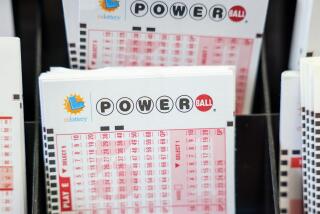RADIO STATIONS ARE WINNERS : LOTTERY IS NO GAMBLE AT KIIS
- Share via
KIIS-FM, which clawed its way to the top of the ratings heap two years ago by giving away as much as $5,000 a day to lucky listeners, is now upping that ante by about 40,000% . . . with a little help from the State Lottery Commission.
“I’m looking forward to the day we can say we’re giving away $2 million,” joked KIIS General Manager Wally Clark.
For the record:
12:00 a.m. Oct. 4, 1985 FOR THE RECORD
Los Angeles Times Friday October 4, 1985 Home Edition Calendar Part 6 Page 16 Column 1 Entertainment Desk 1 inches; 25 words Type of Material: Correction
In Thursday’s Calendar, it was erroneously stated that lottery ticket holders who win $100 or more will be eligible for jackpot prizes. In fact, only $100 winners will be eligible.
KIIS won’t actually be giving that kind of money away, of course.
But, as one of four “official” lottery radio stations in California, the Top 40 powerhouse joins 11 ABC television affiliates throughout California as the broadcast arm of the California lottery.
Beginning today, lottery ticket buyers will be able to listen for winning and losing information on KIIS or watch for it on KABC-TV Channel 7 in the Los Angeles area.
The other official radio stations selected so far are KCBS in San Francisco, KFMB in San Diego and KFBK in Sacramento. According to lottery spokesman Chon Gutierrez, radio stations in 13 other markets are still being sorted out for “official” status.
The other television stations in the consortium that calls itself the Winning Image Network are KGO in San Francisco, KOVR in Sacramento, KGTV in San Diego, KJEO in Fresno, KNTV in Salinas, KEYT in Santa Barbara, KRCR in Chico, KBAK in Bakersfield, KVIQ in Eureka and KESQ in Palm Springs.
Those stations also will be able to cash in on the long-awaited “lottery mania” that state officials have been predicting with the opening today of the state’s first state-sanctioned game of chance.
“The stations that submitted proposals obviously did so for the ratings,” said a spokeswoman for the Los Angeles advertising firm of Needham Harper Worldwide, which is handling lottery publicity.
Ironically, the criteria the lottery commission used to select radio and television stations most often gave the “official” designation to those outlets that needed a ratings boost the least. KIIS, for example, boasts more than 2 million listeners a week. Clark estimates that at least one in four listeners in Los Angeles tune into his station at least once a week.
“We worked to identify the highest-ranking station in a market,” said Gutierrez. “We talked to them, invited them to be part of our promotional campaign and then advised them that after the kickoff, there might be an ongoing relationship.”
He said that even KIIS and the other three “official” radio stations do not yet have a formal contract with the commission.
Gutierrez said Wednesday, on the eve of the Hollywood Bowl lottery kickoff gala (scheduled to begin at 7:45 p.m. today), that the lottery commission was still unclear as to exactly what the radio stations would be asked to do in exchange for their “official” status.
Though no dollar contribution to the lottery system has been demanded, both television and radio stations are expected to donate an unspecified number of daily promotional ad spots at their own expense.
“We’ll also be looking for cross-promotional events with the television network,” he said.
The first televised lottery game show is scheduled to air Oct. 28. Produced by “Dinah Shore Show” producer Fred Tetashore, the 30-minute program will basically feature 10 to 15 lottery finalists spinning “a large colorful wheel” that could win them up to $2 million, according to Gutierrez.
These televised finalists will be selected from among the 6,250 winners who have scratched off their lottery tickets and found that they have won $100 or more. Instant lottery winners can win between $2 and $5,000. Those who win $100 or more may send in those winning tickets to the commission and 10 at a time will then be drawn from a hopper to see who will go on the show.
No host has yet been selected for the weekly program.
“Over the course of the first game (12 weeks), if all the tickets are sold, you’ll have 160 people who will be able to compete,” said a lottery spokeswoman. “That’s if 95% of the tickets are sold. On the television program, they can win $10,000, $50,000, $100,000 or $2 million.”
More to Read
Sign up for Essential California
The most important California stories and recommendations in your inbox every morning.
You may occasionally receive promotional content from the Los Angeles Times.












